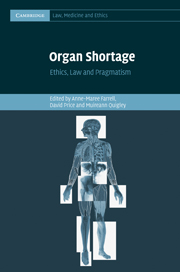Book contents
- Frontmatter
- Contents
- List of figures
- List of tables
- Contributors
- Acknowledgements
- List of abbreviations
- Table of cases
- Table of legislation
- Part I Setting the scene
- Part II Current issues affecting organ shortage
- Part III Strategies for addressing organ shortage
- Part IV Comparative perspectives
- Part V Current reform and future challenges
- 14 Negotiating change: organ donation in the United Kingdom
- 15 Addressing organ shortage in the European Union: getting the balance right
- 16 Promoting organ donation: challenges for the future
- Bibliography
- Index
14 - Negotiating change: organ donation in the United Kingdom
from Part V - Current reform and future challenges
Published online by Cambridge University Press: 29 March 2011
- Frontmatter
- Contents
- List of figures
- List of tables
- Contributors
- Acknowledgements
- List of abbreviations
- Table of cases
- Table of legislation
- Part I Setting the scene
- Part II Current issues affecting organ shortage
- Part III Strategies for addressing organ shortage
- Part IV Comparative perspectives
- Part V Current reform and future challenges
- 14 Negotiating change: organ donation in the United Kingdom
- 15 Addressing organ shortage in the European Union: getting the balance right
- 16 Promoting organ donation: challenges for the future
- Bibliography
- Index
Summary
An ethicist is someone who often finds themself pulled into other people's worlds, sometimes acquiring honorary status and membership, other times remaining very much an outsider. The ethicist serves as a friendly critic, a facilitator, the person who asks the difficult and sometimes inconvenient questions and attempts to resolve some of the challenging dilemmas that people face. In this chapter, I will reflect upon my role as an ethicist in various settings, and the ways in which resolving, or at least acknowledging, ethical issues has become crucial when developing effective strategies and organisational change. I shall also reflect upon how the processes I have been a part of have led me to think about the complex relationship between ethical reflection and public policy-making at a national level. As such this is a very personal piece, the conclusions of which other ethicists may well choose to challenge.
Local first steps
My first significant professional encounter relating to the complex issues around organ donation and transplantation came about because of the dedication of the in-house organ donation co-ordinator at my local hospital, who decided to grasp a particularly prickly nettle that was growing on our patch. A significant difference of opinion had emerged amongst local clinicians regarding the ethics of identifying and caring for people who could potentially go on to become non-heart-beating donors – that is, organ donors who do not become brain dead prior to cardiac death, and whose death is most likely to follow the withholding or withdrawal of medical treatment subsequent to a decision that further treatment is futile.
- Type
- Chapter
- Information
- Organ ShortageEthics, Law and Pragmatism, pp. 215 - 226Publisher: Cambridge University PressPrint publication year: 2011
- 1
- Cited by



